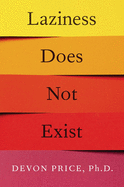
There's a reason that revelatory ideas seem to arrive when completing idle tasks like driving a car or taking a shower. In Laziness Does Not Exist, social psychologist Devon Price convincingly argues that people's brains work best when they step away from the constant barrage of notifications, unanswered e-mails and other obligations--in other words, when they allow themselves to be a little bit lazy. Doing this is harder than it sounds. In the United States, much of life is dictated by what Price calls the "laziness lie," which refers to the social, cultural and economic forces that compel people to work 70-hour weeks and otherwise overextend themselves in the relentless pursuit of "more" (or, in many cases, survival). Frequently this behavior proves unsustainable, causing people to become mentally and physically exhausted and ill.
Through interviews with experts, researchers and a diverse array of worn-out overachievers, Price links the laziness lie to nearly every aspect of modern life, including social media, parenting, weight loss, housework, activism and even watching or reading the news. Price knows the dangers of doing too much firsthand--Price became dangerously ill after years of placing productivity and success ahead of their health. In their conversational and engaging first book, Price offers science-backed suggestions to help sever the link between productivity and self-worth, including taking a phone-free "digital Sabbath," practicing empathy and learning truly how to savor a moment. Most important of all, Price encourages viewing "laziness" for what it is: a sign that the mind and body need some time off. --Angela Lutz, freelance reviewer

